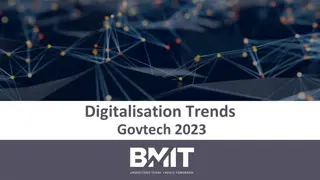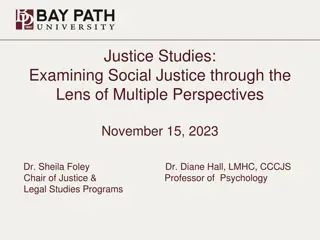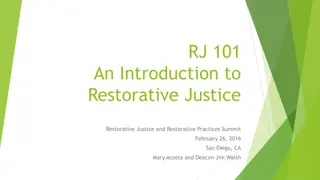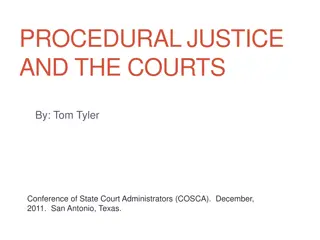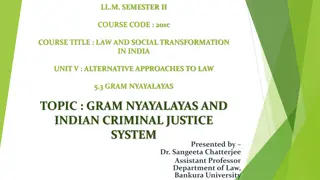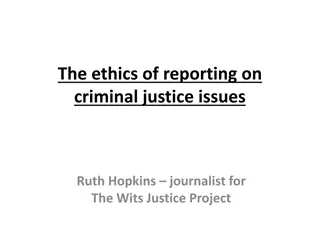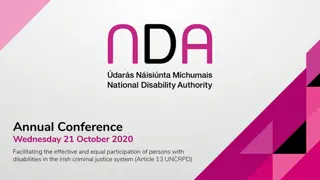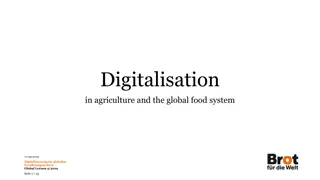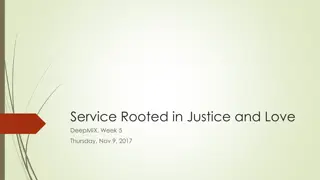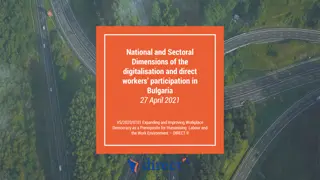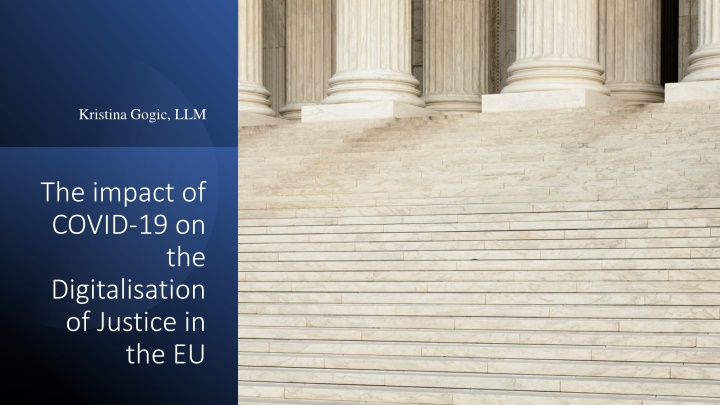
The Impact of COVID-19 on the Digitalisation of Justice in the EU
Delve into the repercussions of the COVID-19 pandemic on the digital transformation of the justice system within the European Union, analyzed through a legal lens.
Download Presentation

Please find below an Image/Link to download the presentation.
The content on the website is provided AS IS for your information and personal use only. It may not be sold, licensed, or shared on other websites without obtaining consent from the author. If you encounter any issues during the download, it is possible that the publisher has removed the file from their server.
You are allowed to download the files provided on this website for personal or commercial use, subject to the condition that they are used lawfully. All files are the property of their respective owners.
The content on the website is provided AS IS for your information and personal use only. It may not be sold, licensed, or shared on other websites without obtaining consent from the author.
E N D
Presentation Transcript
Kristina Gogic, LLM The impact of COVID-19 on the Digitalisation of Justice in the EU
DIGITALISATION OF JUSTICE COVID-19 brought changes faster in the cross-border Court procedures; the digitalisation changed the performance of the procedures; from in paper to digitally The digitalisation of justice is a priority of the EU in the digital age
In November 2020 the European Parliament adopted two proposals which have to make access to justice faster, using mandatory decentralised IT systems for the digital exchange of documents cross-border and taking of evidence; in criminal, civil and commercial matters Two Regulations have been amended; Directive 2014/41/EU regarding the European Investigation Order in criminal matters and Regulation (EC) No 1393/2007 on the service in the Member States of judicial and extrajudicial documents in civil or commercial matters (service of documents), and repealing Council Regulation (EC) No 1348/2000 DIGITALISATION/ LEGISLATION
The updated rules promote the use of videoconferencing or other distance communication technology, to allow a party or witness to be heard online when they are based in another country, which means cross-border These rules had to be updated very fast, because of the impossibility of movement of the parties, because of the health protection Digitalisation in the mentioned context, means improvement of the access to justice and the efficiency of the justice systems Digitalisation means modernisation THE COURTS AND THE NEW RULES
Digitalisation of justice has a lot of advantages, but, as every change has good sides; it has bad sides too What about technical problems? E.g., a link that allows the parties and public access to the hearing doesn t work that is a big problem! It could be an Human Rights violation too! (criminal cases) It is supposed that after pandemic a lot of Courts procedures will be continued in the Courtroom; back to the so-called, paperwork; what is better? A discussion on that subject is still going on. ON-LINE CROSS- BORDER HEARINGS BAD SIDES
Any action relating to the digitalisation of justice must be implemented in full compliance with fundamental rights, such as: - the rights to the protection of personal data; - to a fair trial - to an effective remedy. Then, with the other principles; e.g. proportionality and subsidiarity DIGITALISATION OF JUSTICE AND FUNDAMENTAL RIGHTS AND PRINCIPLES
THE DIGITALISATION OF JUSTICE REQUIRES INVESTMENTS The digitalisation of justice systems in the EU Member States requires upgrading of existing digital systems by the significant investments in infrastructure, design, implementation, maintenance and training strategic investments To achieve any of aforementioned improvements, it is necessary to have: - financial support for the Member States to start the digital transformation of their justice systems; - support for implementing EU-wide initiatives
In December 2020 European Commission presented a proposal for a Regulation of the European Parliament and of the Council on a computerised system for communication in cross- border civil and criminal proceedings (e-CODEX system), and amending Regulation (EU) 2018/1726 (EU-LISA) This proposal relies on a legal basis: combining the Art. 81(2) and 82(1) of the TFEU and principles of subsidiarity and proportionality In June 2021 Council of the EU approved a general approach on the Regulation of the e- CODEX system IMPROVING the e-CODEX SYSTEM
THE The proposed regulation sets out the process of transferring the e-CODEX system from a consortium of Member States to eu-LISA The transfer of e-CODEX to eu-LISA should take place in the first half of 2023 Before the transfer, a Regulation should be adopted of course! And regulation should be in the accordance with the EU legal acts and case- law of the CJEU of course! TRANSFER OF E-CODEX SYSTEM TO EU-LISA
On December 1st, 2021 European Commission adopted a proposal for a regulation of the European Parliament and Council on the digitalisation of judicial cooperation and access to justice in cross-border civil, commercial and criminal matters and amending certain acts in the field of judicial cooperation It is a follow-up to the Communication on digitalisation of justice in the EU (December 2020) from the Commission to the EP, the Council, the European Economic and Social Committee and the Committee of the regions A European electronic access point shall be established on the European e-Justice Portal; for the electronic communication between natural or legal person and competent authority; Shall exist an obligation to accept a EEA point for the competent authorities of the MS A regulation; A follow up to the Communication on Digitalisation of Justice (EU)
According to the adopted proposal for a regulation, a competent authority of the MS, shall allow a distance hearing upon the request of the partie/representative of another MS, when such technology is available: - in civil and commercial matters: the other party/ies were given the possibility to submit an opinion on the use of the distance communication technology; - in criminal matters: the particular circumstances of the case justify the use of such technology and with the expressed consent of the suspect, accused or convicted person to use such a technology/with the possibility to seek the advice of a lawyer A HEARING THROUGH THE DISTANCE COMMUNICATION TECHNOLOGY
The Digitalisation of Justice started in Croatia in 2010, e.g. e-Consulting, a digital tool which is in use for consulting with the public on the drafts laws proposals a very useful tool Later were established other IT tools as: e-subject, e-citizens, e-communication, e-distraint. When pandemic started, e-court procedures started soon; before were in the paper format in the economical and financial way it is better; it is cheaper which means without travel/accommodation costs for the parties Bad sides? Check/look at slide No. 5 DIGITALISATION OF JUSTICE - CROATIA
The Croatian Ministry of Justice and Administration has an independent sector for the Digitalisation of Justice and Public Administration A pandemic accelerates the development of digitalisation in general; means of justice too In July 2021 Croatia adopted the National recovery and resilience Plan 2021-2026 in which digitalisation of the public administration has an important role in fact, its improvement DIGITALISATION OF JUSTICE - CROATIA
REFERENCES European Commission, Policies, Digitalisation of Justice <https://ec.europa.eu/info/policies/justice-and-fundamental-rights/digitalisation- justice/communication-digitalisation-justice-european-union-and-proposal-e- codex-regulation_en#more-information> accessed 23 July 2021 European Parliament, News <https://www.europarl.europa.eu/news/en/press- room/20201120IPR92137/digital-justice-ep-endorses-rules-on-service-of- documents-and-taking-of-evidence> accesses 23 July 2021 European Commission, Policies, Justice and Fundamental Rights <https://ec.europa.eu/info/policies/justice-and-fundamental-rights/digitalisation- justice_en> accessed 23 July 2021
THANK YOU FOR YOUR ATTENTION! QUESTIONS? E-mails addresses: kristinagogic1@gmail.com gogic.kristina11@outlook.com kristina@kristinagogic.com Website: www.kristinagogic.com


